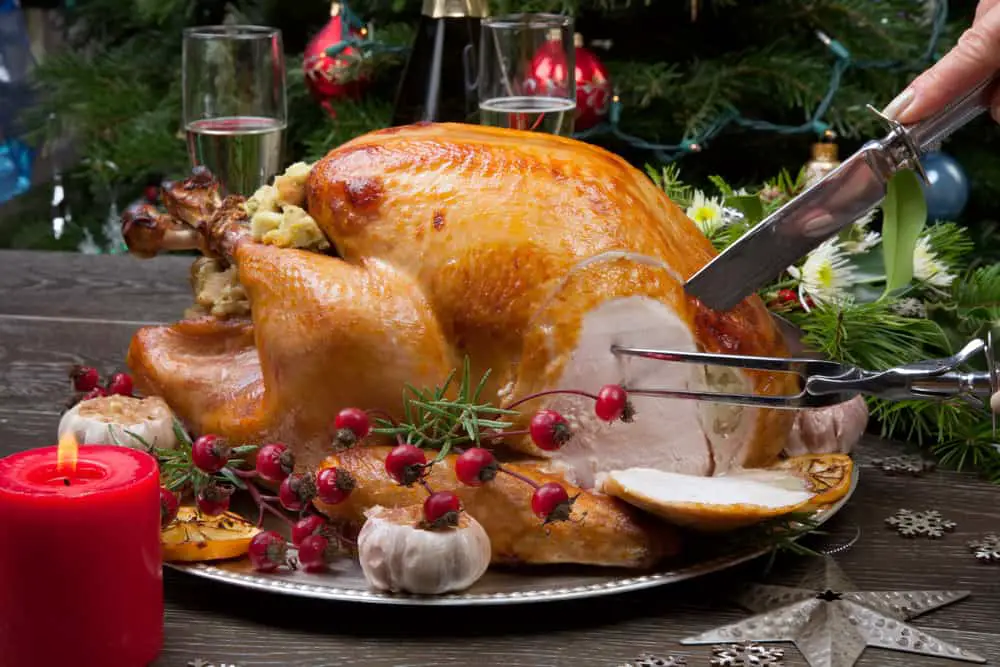Last Updated on 22nd April 2022 by
A turkey is a celebration staple at every dinner table. You can’t spell Thanksgiving, Christmas, or any celebratory holiday without a turkey.
As the centerpiece of the feast, there’s a lot of pressure that comes with cooking turkey as this big bird is prone to overcooking or undercooking with the wrong temperature and cooking time.
Keeping in mind the common mistakes we make when cooking turkey and learning how to avoid them will help us prepare the most delicious turkey– leaving you, your family, and your guests full to the brim with the best turkey you’ve ever prepared.
If you’re ready to dive into turkey prep, read on.
How to Cook Turkey
First things first, let’s learn how to cook a turkey. The art of learning to cook a turkey starts with preparing the bird itself– and correctly at that.
Thaw Turkey
You can buy frozen whole turkeys from the supermarket and store them in the freezer. However, when your event is near, make sure to thaw the turkey on the fridge, not under the warm weather and definitely not under the sun.
Frozen turkeys can take three or more days to thaw, depending on the bird’s weight, so make sure to adjust your defrosting schedule accordingly.
Preparing the Turkey for Cooking
So, how to cook a turkey in the oven? Once you have your thawed turkey, take the giblets out of the turkey and clean it inside out. Make sure the turkey is free from excess fat or feather quills. You can save the giblets for stock and stuffing later on.
Pat the turkey with a paper towel, then on a large roasting pan, place a large sheet of extra-wide foil and place the turkey. Slather with salt and pepper the inside of the cavity.
Place your desired stuffing on the cavity like thyme, lemons, onions, garlic. Make sure to butter or oil the outside of the turkey and sprinkle with salt and pepper. Tie the legs together just at the top of the drumsticks.
To achieve a moist turkey, we recommend brining the turkey, which involves soaking it in water, salt, and herb solution overnight. You can also opt to stuff it vegetables, fruits, and herbs, and make sure to let a freshly roasted turkey rest to make it moist.
Prepping the Oven
For this part, you would need sharp knives, a meat thermometer, a roasting pan (or rack), and toothpicks.
Prepping your oven is just as important as preparing the bird itself. We suggest using a roasting rack as it allows air circulation even at the bottom of your turkey, so it is evenly cooked and reduces the risk of your turkey having soggy skin. You can also use a roasting pan, and you can also add a little bit of water to the roasting pan to keep the turkey moist.
After taking the turkey out from the fridge to sit at room temperature, preheat the oven for up to 425°F. Start strong since you can always put the temperature down later to get crispy skin and juicier meat. After 30 to 40 minutes, bring down the temperature to 350°F until the end of the cooking time.
The secret to cooking a turkey is patience. Good things (especially food!) take time, so be patient in waiting for your turkey to cook. An excellent (and essential tip) is not to open the oven too often. This cools the oven and slows the cooking time of the turkey.
Another tip is to place the turkey leg in. Why? Turkey legs and thighs need a higher temperature to cook and will be perfect for the warmer temperature inside the oven, while the breast part near the door cooks perfectly in lower heat.
How Long Does it Take to Cook a Turkey?
What temperature do we cook a turkey without undercooking or burning it? Figuring out the best time and temperature to cook a turkey is very tricky and takes a lot of risks and trials and errors, but generally, you can use your calculator to do that.
For every pound of unstuffed turkey, you would need the heat of 350°F for 13 minutes or 15 minutes for a stuffed turkey.
For an unstuffed 8 to 12 pound turkey, it is recommended to be cooked at 325°F for two ¾ to 3 hours or at the following temperatures and times for a 12 to 14-pound turkey:
425°F for 2 ¼ to 2 ½ hours
400°F for 2 ½ to 2 ¾ hours
350°F for 2 ¾ to 3 hours
325°F for 3 to 3 ¾ hours
You can scale different temperatures based on the formula as stated above. Most importantly, do remember to make use of a meat thermometer. A meat thermometer helps tell when the insides of a turkey are thoroughly cooked, and ideally, the temperature on the meat thermometer should read at 165°F on the thickest part of the thigh meat and the thickest part of the breast meat.
According to the USDA, it is at this temperature that all turkey cooked raw should be at after cooking to make sure that all salmonella are killed, and the turkey is safe to eat.
Remember that roasting meat, especially large ones like turkeys, tends to still cook after taking them out of the oven due to the residual heat. This is called carryover cooking.
During the rest time of your freshly-taken-out-of-the-oven turkey, it is still cooking. This can be tricky as overcooking your turkey (at a temperature of more than 170°F) would mean higher chances of drying out the turkey.
This is why it is essential to use a meat thermometer properly (at 2.5 hours after cooking and then 15 minutes after that) and stick them into the right spot to ensure the thickest part of the thighs and breasts are at exactly 165°F.
Turkey is a celebratory table staple served across centuries. Whether you are preparing a turkey for the family or guests, cooking turkey can be tricky and easy at a special event or an ordinary day. But once you’ve got all the details down with a bit of practice, calculation, and patience, cooking turkey will be as easy as taking a walk in the park, and you’ll find yourself cooking turkey with no sweat.
I'm Pauline, a mother of four grown children, my passion for cooking stemmed from the joy i get cooking for my family. I love to try new dishes, especially when dining out but creating and sharing my own recipes is my favourite thing to do!



binance
Wednesday 17th of January 2024
Thanks for sharing. I read many of your blog posts, cool, your blog is very good. https://www.binance.info/ar-BH/join?ref=B4EPR6J0
labākais binance norādījuma kods
Saturday 13th of January 2024
Can you be more specific about the content of your article? After reading it, I still have some doubts. Hope you can help me. https://www.binance.info/lv/join?ref=DB40ITMB